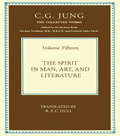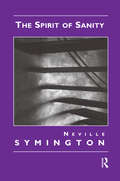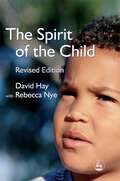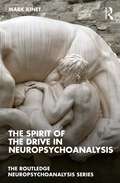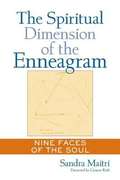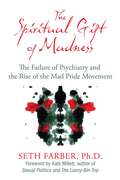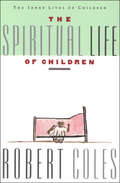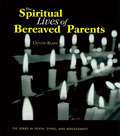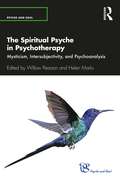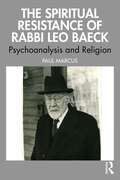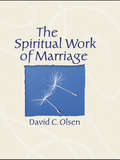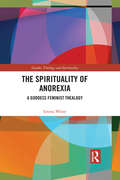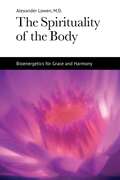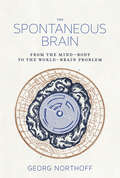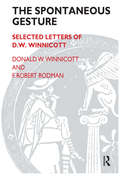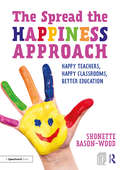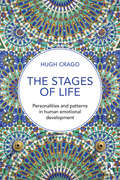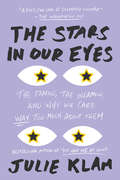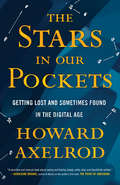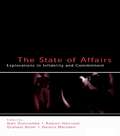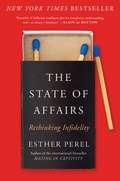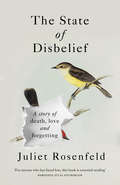- Table View
- List View
The Spirit of Man in Art and Literature: Spirit In Man, Art, And Literature (Collected Works of C. G. Jung #5)
by C.G. JungFirst published in 1967. There are different ways of looking at the achievements of outstanding personalities. In reading this book, the reader will be in touch with some of Jung's best insights into artistic and literary creation. The essays are on Paracelsus, Freud, Richard Wilhelm, Picasso, and Joyce's Ulysses. There are also two chapters on poetry and literature.
The Spirit of Sanity
by Neville SymingtonA rare and unusual consideration of the spiritual dimensions of sanity from a psychoanalytic perspective, this transcription of a series of seven lectures delivered at the Tavistock Clinic capture the spontaneity and immediacy of the interplay between one of the world's most eminent psychoanalysts and an audience of his peers. The author of the established psychoanalytic classics Emotion and Spirit, Narcissism: A New Theory; and The Analytic Experience here brings his characteristic insight and innovation to the question of how the traditional Freudian view of religious belief as neurotic or illusory can be reconciled with a way of taking up psychoanalytic work without abandoning the spiritual dimension to life.
The Spirit of the Child: Revised Edition
by David HaySpirituality is increasingly acknowledged to be an essential part of child development. David Hay argues for the inclusion of spiritual awareness as a cross-curricular element in the school syllabus to promote the development of morality and social cohesion. While culturally constructed pressures and the decline in institutional religion have led to the suppression of spiritual expression, children are, the author maintains, capable of profound and meaningful beliefs from an early age. A three-year research study into young children's spirituality and its survival value informs Hay's view that spirituality in education needs to overcome traditional approaches and should adopt a theory of spirituality that includes religion but is not confined to it. This stimulating book will encourage educators, parents and others involved in teaching children to consider new approaches to foster children's natural spiritual development.
The Spirit of the Drive in Neuropsychoanalysis (The Routledge Neuropsychoanalysis Series)
by Mark KinetThe Spirit of the Drive in Neuropsychoanalysis gives a concise introduction to the basics of neuropsychoanalysis, both theoretically and clinically. Kinet uses a colloquial approach to discuss topics such as the dynamic and descriptive unconscious, dream theory, homeostasis, affect and awareness, pleasure and jouissance, the signifier and the drive. Throughout the volume, Kinet is informed by the field-defining work of Mark Solms and Ariane Bazan and their respective Freudian or Lacanian origins. Asking questions on the relevance of neuropsychoanalysis in a clinical setting, this book offers vital insight into how analysts can bring this field into their day-to-day work with clients. Clinical and other interludes illustrate and illuminate the matter from the perspective of the psychoanalyst at work. Written in an accessible style and part of The Routledge Neuropsychoanalysis Series, this volume will interest both those experienced with neuropsychoanalysis and those approaching the topic for the first time.
The Spiritual Brain: A Neuroscientist's Case for the Existence of the Soul
by Denyse O'Leary Mario BeauregardDo religious experiences come from God, or are they merely the random firing of neurons in the brain? Drawing on his own research with Carmelite nuns, neuroscientist Mario Beauregard shows that genuine, life-changing spiritual events can be documented. He offers compelling evidence that religious experiences have a nonmaterial origin, making a convincing case for what many in scientific fields are loath to consider—that it is God who creates our spiritual experiences, not the brain. Beauregard and O'Leary explore recent attempts to locate a "God gene" in some of us and claims that our brains are "hardwired" for religion—even the strange case of one neuroscientist who allegedly invented an electromagnetic "God helmet" that could produce a mystical experience in anyone who wore it. The authors argue that these attempts are misguided and narrow-minded, because they reduce spiritual experiences to material phenomena. Many scientists ignore hard evidence that challenges their materialistic prejudice, clinging to the limited view that our experiences are explainable only by material causes, in the obstinate conviction that the physical world is the only reality. But scientific materialism is at a loss to explain irrefutable accounts of mind over matter, of intuition, willpower, and leaps of faith, of the "placebo effect" in medicine, of near-death experiences on the operating table, and of psychic premonitions of a loved one in crisis, to say nothing of the occasional sense of oneness with nature and mystical experiences in meditation or prayer. Traditional science explains away these and other occurrences as delusions or misunderstandings, but by exploring the latest neurological research on phenomena such as these, The Spiritual Brain gets to their real source.
The Spiritual Dimension of the Enneagram
by Sandra MaitriA groundbreaking exploration of the spiritual dimension of working with the enneagram by one of its earliest students and teachers in America.Here is one of the first books to explore in an authentic and comprehensive way the original spiritual dimension of the enneagram. Among the most knowledgeable teachers of the enneagram in America, Sandra Maitri shows how the enneagram not only reveals our personalities, but illuminates a basic essence within each of us. She shows how traversing the inner territory particular to our ennea-type can bring us profound fulfillment and meaning, as well as authentic spiritual development.
The Spiritual Gift of Madness: The Failure of Psychiatry and the Rise of the Mad Pride Movement
by Kate Millett Seth FarberA bold call for the “insane” to reclaim their rightful role as prophets of spiritual and cultural transformation • Explains how many of those diagnosed as schizophrenic, bipolar, and other forms of “madness” are not ill but experiencing a spiritual awakening • Explores the rise of Mad Pride and the mental patients’ liberation movement • Reveals how those seen as “mad” must embrace their spiritual gifts to help the coming global spiritual transition Many of the great prophets of the past experienced madness--a breakdown followed by a breakthrough, spiritual death followed by rebirth. With the advent of modern psychiatry, the budding prophets of today are captured and transformed into chronic mental patients before they can flower into the visionaries and mystics they were intended to become. As we approach the tipping point between extinction and global spiritual awakening, there is a deep need for these prophets to embrace their spiritual gifts. To make this happen, we must learn to respect the sanctity of madness. We need to cultivate Mad Pride. Exploring the rise of Mad Pride and the mental patients’ liberation movement as well as building upon psychiatrist R. D. Laing’s revolutionary theories, Seth Farber, Ph.D., explains that diagnosing people as mad has more to do with social control than therapy. Many of those labeled as schizophrenic, bipolar, and other kinds of “mad” are not ill but simply experiencing different forms of spiritual awakening: they are seeing and feeling what is wrong with society and what needs to be done to change it. Farber shares his interviews with former schizophrenics who now lead successful and inspiring lives. He shows that it is impossible for society to change as long as the mad are suppressed because they are our catalysts of social change. By reclaiming their rightful role as prophets of spiritual and cultural revitalization, the mad--by seeding new visions for our future--can help humanity overcome the spiritual crisis that endangers our survival and lead us to a higher and long-awaited stage of spiritual development.
The Spiritual Life of Children
by Robert ColesA look at faith through the voices of children from varied religious backgrounds, by the Pulitzer-winning author of The Moral Intelligence of Children. A New York Times Notable Book What do children think about when they consider God, Heaven and Hell, the value of life in the here and now, and the inevitability of death? Child psychiatrist, Pulitzer Prize-winning writer, and Harvard professor Robert Coles spent thirty years interviewing hundreds of children—from South America and Europe to Africa and the Middle East—who are developing concepts of faith even as they struggle to understand its contradictions. Be they Catholic or Protestant, Jewish children from Boston, Pakistani children in London, agnostics, Native Americans, or young Christians in the American South, they offer honest, enlightening and sometimes startling ideas of a spiritual existence. A Hopi girl who knows for a fact that we are resurrected as birds; an African American child who believes God exists as a hurricane to &“blow away&” drug dealers; a young Christian who needs his faith to cope with the death of his sister, lest she be just &“a big heartache to us till the day we die&”; and a Tennessee child who rationalizes his belief by admitting that &“if there's no God, that's all there is, ashes.&” The Spiritual Life of Children is &“a remarkable book. The generosity of vision that characterizes Dr. Coles's enterprise enables him to create a climate where words of great beauty and truthfulness can be spoken.&” —The New York Times
The Spiritual Lives of Bereaved Parents (Series in Death, Dying, and Bereavement)
by Dennis KlassThis book describes how parents lose, find, or relocate spiritual anchors after the death of their child. It describes how ordinary people reconstruct their lives after their foundations have shifted, and how they make sense of their world after one of their centers of meaning has been removed. Klass grounds his descriptions of spirituality in his scholarly study of comparative religions, and in his two decades studying the lives of bereaved parents. He argues that continuing bonds with their dead children can give parents a new transcendent reality. Deceased children, like saints or bodhisattvas, can offer a bridge between the profane and sacred worlds, support parents as they find meaning in a world made forever poorer, and bind together a community adequate to parents' grief. The book reports Klass's clinical practice and his work as advisor to a bereaved parents self-help support group.
The Spiritual Psyche in Psychotherapy: Mysticism, Intersubjectivity, and Psychoanalysis (Psyche and Soul)
by Willow Pearson Helen MarloThis book examines the interaction of spiritual and psychoanalytic lineages with psychotherapy in everyday practice. Written by a team of seasoned clinicians and illustrated through clinical vignettes, chapters explore topics pertaining to the mystical dimensions of psychological and spiritual life and how it may be integrated into clinical practice. Topics discussed include dreams, dissociation, creativity, therapeutic relationship, free association, transcendence, poetry, paradox, doubleness, loss, death, grief, mystery, embodiment and soul. The authors, clinicians with decades of experience in psychotherapy, psychoanalysis and spiritual practice, draw from their deep engagement with spirituality and psychoanalysis, focusing on a particular theme and its application to clinical work that is supported by the generative conversation among these lineages. At once applied and theoretical, this book weaves insights from the heart of Vajrayana Buddhism, Zen Buddhism, Christianity, Catholicism, Ecumenicism, Integral Spirituality, Judaism, Kaballah, Non-violence, Sufism and Vedanta. They are in conversation with psychoanalytic perspectives including Jungian, Post-Jungian, Winnicottian, Bionian, Post-Bionian and Relational. A felt sense of the spiritual psyche in clinical practice emerges from this conversation among spiritual and psychoanalytic lineages, beckoning clinicians ever further on the path of spiritually rooted, psychodynamic practice.
The Spiritual Resistance of Rabbi Leo Baeck: Psychoanalysis and Religion
by Paul MarcusThe Spiritual Resistance of Rabbi Leo Baeck provides an overview of the life of Dr. Leo Baeck (1873–1956), a German-Jewish rabbi, theologian, historian and Holocaust survivor, from a psychoanalytic perspective.Paul Marcus approaches Baeck’s life and intellectual/theological contribution as it interfaces with a broadly defined psychoanalysis. This book describes and explains how Baeck maintained the rudiments of his autonomy, integration and humanity while remaining in Nazi Germany and while in the ghetto Theresienstadt, displaying astonishing courage, character, and goodness—a triumph of a civilized person amidst Nazi brutality. Marcus also considers psychic resilience and moral psychology and assesses contemporary criticisms of Baeck.The Spiritual Resistance of Rabbi Leo Baeck will be of interest to academics and scholars of psychoanalytic studies, spirituality, Jewish studies and resistance. It will also appeal to psychoanalysts in training and in practice.
The Spiritual Work of Marriage
by David C. OlsenLearn how to help couples to navigate and resolve the spiritual themes present in marriage Statistically speaking, about half of all first marriages fail. The Spiritual Work of Marriage comprehensively discusses an issue that is central to addressing committed relationships and intimacy—the difficult, and yet very common, spiritual work that exists within marriage. This insightful guide goes deeper into ways to improve marital intimacy by explaining its spiritual dimension and describing a variety of spiritual themes that every couple deals with and must resolve. The book contains practical case study material, questions for group discussion, and a series of spiritual and theological theories tied to powerful marital dynamics. Author Dr. David Olsen, certified pastoral counselor and certified marriage and family therapist, explains approaches that every counselor can use when attempting to help couples navigate and work through marital intimacy and spiritual issues. The Spiritual Work of Marriage boldly and sensitively examines the themes of acceptance, working through idolatry, the longing for redemption from old family issues, and the necessity of repentance. Topics discussed in The Spiritual Work of Marriage include: marriage as spiritual crucible acceptance as a key element in spirituality and recovery idolatry as something that clocks acceptance redemption from old wounds repentance as a mental concept the complexity of forgiveness in marriage the possibility of salvation in marriage The Spiritual Work of Marriage is an essential resource for pastoral counselors, clergy, seminary professors teaching pastoral care, and marriage and family therapists interested in spirituality.
The Spirituality of Anorexia: A Goddess Feminist Thealogy (Gender, Theology and Spirituality)
by Emma WhiteWidely popularized images of unobtainable and damaging feminine ideals can be a cause of profound disjunction between women and their bodies. A consequence of this dissonance is an embodied performance of these ideals with the potential development of disordered eating practices, such as anorexia nervosa. This book develops a spirituality of anorexia by suggesting that these eating disorders are physical symptoms of the general repression of feminine nature in our culture. Furthermore, it puts forward Goddess feminism as a framework for a healing therapeutic model to address anorexia and more broadly, the "slender ideal" touted by society. The book focuses on the female body in contemporary society, specifically the development of anorexia nervosa, and what this expression communicates about female embodiment. Drawing upon the work of a variety of theorists, social commentators, liberation theologians and thealogians, it discusses the benefits of adopting female-focused myths, symbols and rituals, drawing upon the work of Marion Woodman and Naomi Goldenberg. Ultimately, it theorises a thealogical approach to anorexia aimed at displacing the damaging discourses that undermine women in the twenty-first century. Offering an alternative model of spirituality and embodiment for contemporary women, this book will be of keen interest to scholars of theology, religious studies, gender studies and psychology.
The Spirituality of the Body
by Alexander LowenIn The Spirituality of the Body, Alexander Lowen provides a unique perspective about the nature of spirituality. Lowen views the body as the outer manifestation of the spirit and defines grace as the divine spirit acting within the body. For the healthy individual the divine spirit is experienced as the natural gracefulness of the body and is reflected in the person's behavior. In a healthy body, movement, feeling, and thinking are integrated in grace and harmony. This book includes body-psychotherapy techniques and exercises aimed at alleviating muscular tension and restoring the body's natural grace. This spiritual grace involves a sense of connectedness to a higher order. In this state of grace we feel a kinship with all living creatures, and recognize our connection to our environment and to the world.
The Spontaneous Brain: From the Mind-Body to the World-Brain Problem
by Georg NorthoffAn argument for a Copernican revolution in our consideration of mental features—a shift in which the world-brain problem supersedes the mind-body problem. Philosophers have long debated the mind-body problem—whether to attribute such mental features as consciousness to mind or to body. Meanwhile, neuroscientists search for empirical answers, seeking neural correlates for consciousness, self, and free will. In this book, Georg Northoff does not propose new solutions to the mind-body problem; instead, he questions the problem itself, arguing that it is an empirically, ontologically, and conceptually implausible way to address the existence and reality of mental features. We are better off, he contends, by addressing consciousness and other mental features in terms of the relationship between world and brain; philosophers should consider the world-brain problem rather than the mind-body problem. This calls for a Copernican shift in vantage point—from within the mind or brain to beyond the brain—in our consideration of mental features. Northoff, a neuroscientist, psychiatrist, and philosopher, explains that empirical evidence suggests that the brain's spontaneous activity and its spatiotemporal structure are central to aligning and integrating the brain within the world. This spatiotemporal structure allows the brain to extend beyond itself into body and world, creating the “world-brain relation” that is central to mental features. Northoff makes his argument in empirical, ontological, and epistemic-methodological terms. He discusses current models of the brain and applies these models to recent data on neuronal features underlying consciousness and proposes the world-brain relation as the ontological predisposition for consciousness.
The Spontaneous Gesture: Selected Letters of D.W. Winnicott
by Donald W. Winnicott F. Robert RodmanThe collected letters of Donald Winnicott, a central figure in British psychoanalysis in the first post-Freud generation. They provide a vivid picture of Winnicott’s ideas and personality. Winnicott’s writings have become more and more influential over the years. His letters, published here, command immediate attention. Together with an insightful introduction by F. Robert Rodman, who sketches Winnicott’s life and traces the development of his ideas, they provide a vivid picture of the thought and personality of a man who has taught us much about our deepest selves.
The Spread the Happiness Approach: Happy Teachers, Happy Classrooms, Better Education
by Shonette Bason-WoodBoth practical and inspiring, this book is designed to empower educators and school leaders to make clear and simple adjustments to their practice for a lasting impact on the happiness and well- being of staff and children and ultimately on academic standards. It includes practical tips and activities to help teachers generate a lasting atmosphere of positivity and happiness in the classroom plus clear strategies to help leaders to embed the Spread the Happiness approach throughout their school and across the curriculum.This book includes detailed case studies, a five-week programme of taster challenges and a section on measuring outcomes and sharing success. The Spread the Happiness approach invites teachers to undertake a 27-day challenge, which encourages problem solving and challenges them to make their immediate workplace happier. It identifies the strengths of adults and children and sets realistic goals to achieve as an individual, as a team and even as a community.This powerful resource will be of great interest to all teachers and school leaders, as well as trainee teachers and students on leadership or early educational courses.
The Stag Hunt and the Evolution of Social Structure
by Brian SkyrmsBrian Skyrms' study of ideas of cooperation and collective action explores the implications of a prototypical story found in Rousseau's A Discourse on Inequality. It is therein that Rousseau contrasts the pay-off of hunting hare (where the risk of non-cooperation is small and the reward equally small) against the pay-off of hunting the stag (where maximum cooperation is required but the reward is much greater. ) Thus, rational agents are pulled in one direction by considerations of risk and in another by considerations of mutual benefit. Written with Skyrms' characteristic clarity and verve, The Stage Hunt will be eagerly sought by readers who enjoyed his earlier work Evolution of the Social Contract. Brian Skyrms, distinguished Professor of Logic and Philosophy of Science and Economics at the University of California at Irvine and director of its interdisciplinary program in history and philosophy of science, has published widely in the areas of inductive logic, decision theory, rational deliberation and causality. Seminal works include Evolution of the Social Contract (Cambridge, 1996), The Dynamics of Rational Deliberation (Harvard, 1990), Pragmatics and Empiricism (Yale, 1984), and Causal Necessity (Yale, 1980).
The Stages of Life: Personalities and Patterns in Human Emotional Development
by Hugh CragoIs personality "in the genes"? Do our infant experiences matter, even though we can’t remember them? Why do patterns repeat within the lives of individuals and families? The Stages of Life provides answers to these and other intriguing questions, and presents a refreshingly readable introduction to human development from birth to death. The book synthesises those theories and research findings that are most helpful in explaining the paradoxes and complexities of human personality and human problems. The book provides a thought-provoking discussion of several important topics, including: how personality evolves in response to both genetic and social influences how individuals differ and what this means for them how some problems tend to develop at particular stages of the life course, from early childhood through to midlife and old age. Throughout the book, Hugh Crago relates both ‘nature’ and ‘nurture’ to the challenges individuals must face from early childhood through to old age. He draws attention to often-ignored clinical findings about ‘cross generational repetition’ in families, and shows how recent developments in epigenetics may supply an explanation for such mysterious phenomena. Written without jargon, and full of new and provocative ideas, the book will be of great interest to students of counselling and psychotherapy, and it is also has much to offer the general reader. With its engaging examples from history, literature and the author’s own life, readers will find that The Stages of Life illuminates puzzles in their own lives and opens a road to self-acceptance.
The Stars in Our Eyes: The Famous, the Infamous, and Why We Care Way Too Much About Them
by Julie KlamFrom bestselling author Julie Klam comes a lively and engaging exploration of celebrity: why celebrities fascinate us, what it means to be famous today, and why celebrities are so important. “When I was young I was convinced celebrities could save me,” Julie Klam admits in The Stars in Our Eyes, her funny and personal exploration of fame and celebrity. As she did for subjects as wide-ranging as dogs, mothers, and friendship, Klam brings her infectious curiosity and crackling wit to the topic of celebrity. As she admits, “I’ve always been enamored with celebrities,” be they movie stars, baseball players, TV actors, and now Internet sensations. “They are the us we want to be.” Celebrities today have a global presence and can be, Klam writes, “some girl on Instagram who does nude yoga and has 3.5 million followers, a thirteen-year-old ‘viner,’ and a Korean rapper who posts his videos that are viewed millions of times.” In The Stars in Our Eyes, Klam examines this phenomenon. She delves deep into what makes someone a celebrity, explains why we care about celebrities more than ever, and uncovers the bargains they make with the public and the burdens they bear to sustain this status. The result is an engaging, astute, and eye-opening look into celebrity that reveals the truths about fame as it elucidates why it’s such an important part of life today.
The Stars in Our Pockets: Getting Lost and Sometimes Found in the Digital Age
by Howard AxelrodWhat shapes our sense of place, our sense of time, and our memory? How is technology changing the way we make sense of the world and of ourselves?The human brain's ability to adapt has been an evolutionary advantage for the last 40,000 years, but now, for the first time in human history, we're effectively living in two environments at once--the natural and the digital--and many of the traits that help us online don't help us offline, and vice versa. Drawing on his experience of acclimating to a life of solitude in the woods and then to digital life upon his return to the city, Howard Axelrod explores the human brain's impressive but indiscriminate ability to adapt to its surroundings. The Stars in Our Pockets is a portrait of, as well as a meditation on, what Axelrod comes to think of as "inner climate change." Just as we're losing diversity of plant and animal species due to the environmental crisis, so too are we losing the diversity and range of our minds due to changes in our cognitive environment.As we navigate the rapid shifts between the physical and digital realms, what traits are we trading without being aware of it? The Stars in Our Pockets is a personal and profound reminder of the world around us and the worlds within us--and how, as alienated as we may sometimes feel, they were made for each other.
The State of Affairs: Explorations in infidelity and Commitment (LEA's Series on Personal Relationships)
by Jean Duncombe, Kaeren Harrison, Graham Allan and Dennis MarsdenThis volume brings together contributions on the study of sexual affairs in committed personal relationships. The editors enlisted colleagues with varied theoretical and methodological perspectives from Britain, the United States, and other countries. Together, their contributions provide a broad, cross-national perspective on affairs. Grounded in theoretical discussion, the chapters in this book introduce data collected by a broad range of methods, including attitude surveys, large statistical cohort studies, case studies, depth interviews, and group discussions. A number of contributors locate the theoretical discussion of affairs within the broader contemporary ordering of committed relationships, contrasting the liberating and empowering aspects of affairs with the damage they may inflict on society as a whole and on the lives of individuals and families. The themes of passion, transgression, secrecy, lies, betrayal, and gossip are common to a range of chapters throughout. The volume provides broad literature reviews and theoretical discussions concerning particular aspects of affairs, such as communication and jealousy. In addition, case studies are used for the more detailed exploration of heterosexual affairs and contemporary developments in gay male and lesbian relationships. The State of Affairs will be of interest to researchers, scholars, and students in social psychology; communication; sociology; family, social, and clinical psychology; and for practitioners in couple counseling.
The State of Affairs: Rethinking Infidelity
by Esther Perel<P>Iconic couples’ therapist and bestselling author of Mating in Captivity Esther Perel returns with a provocative look at relationships through the lens of infidelity. <P>Affairs, she argues, have a lot to teach us about the human heart—what we expect, what we think we want, and what we feel entitled to. They offer a unique window into our personal and cultural attitudes about love, lust, and commitment. Through examining illicit love from multiple angles, Perel invites readers into an honest, enlightened, and entertaining exploration of modern marriage in its many variations. <P>An affair: it can rob a couple of their relationship, their happiness, their very identity. And yet, this extremely common human experience is so poorly understood. Adultery has existed since marriage was invented, and so too the prohibition against it—in fact, it has a tenacity that marriage can only envy. So what are we to make of this time-honored taboo—universally forbidden yet universally practiced? Why do people cheat—even those in happy marriages? Why does an affair hurt so much? When we say infidelity, what exactly do we mean? Do our romantic expectations of marriage set us up for betrayal? Is there such a thing as an affair-proof marriage? Is it possible to love more than one person at once? Can an affair ever help a marriage? Perel weaves real-life case stories with incisive psychological and cultural analysis in this fast-paced and compelling book. <P>For the past ten years, Perel has traveled the globe and worked with hundreds of couples who have grappled with infidelity. Betrayal hurts, she writes, but it can be healed. An affair can even be the doorway to a new marriage—with the same person. With the right approach, couples can grow and learn from these tumultuous experiences, together or apart. <P>Fiercely intelligent, The State of Affairs provides a daring framework for understanding the intricacies of love and desire. As Perel observes, “Love is messy; infidelity more so. But it is also a window, like no other, into the crevices of the human heart.” <P><b>A New York Times Bestseller</b>
The State of Disbelief: A story of death, love and forgetting
by Juliet Rosenfeld'A beautifully written, profoundly moving and immersive account of grief that will bring solace.' - Louise France, The TimesA revelatory book about death and mourning by a psychotherapist faced with sudden bereavement.When Juliet Rosenfeld’s husband dies of lung cancer only seven months into their marriage, everything she has learnt about death as a psychotherapist is turned on its head.As she attempts to navigate her way through her own devastating experience of loss, Rosenfeld turns to her battered copy of Freud’s seminal essay 'Mourning and Melancholia'. Inspired by the distinction Freud draws between the savage trauma of loss that occurs at the moment of death - grief - and the longer, unpredictable evolution of that loss into something that we call mourning, Rosenfeld finds herself dramatically rethinking the commonly held therapeutic idea of 'working through stages of grief'.This is a beautifully written meditation on what the investment of love means and how to find your own path after bereavement in order for life to continue.
The State of Disbelief: A story of death, love and forgetting
by Juliet Rosenfeld'A beautifully written, profoundly moving and immersive account of grief that will bring solace.' - Louise France, The TimesA revelatory book about death and mourning by a psychotherapist faced with sudden bereavement.When Juliet Rosenfeld’s husband dies of lung cancer only seven months into their marriage, everything she has learnt about death as a psychotherapist is turned on its head.As she attempts to navigate her way through her own devastating experience of loss, Rosenfeld turns to her battered copy of Freud’s seminal essay 'Mourning and Melancholia'. Inspired by the distinction Freud draws between the savage trauma of loss that occurs at the moment of death - grief - and the longer, unpredictable evolution of that loss into something that we call mourning, Rosenfeld finds herself dramatically rethinking the commonly held therapeutic idea of 'working through stages of grief'.This is a beautifully written meditation on what the investment of love means and how to find your own path after bereavement in order for life to continue.
